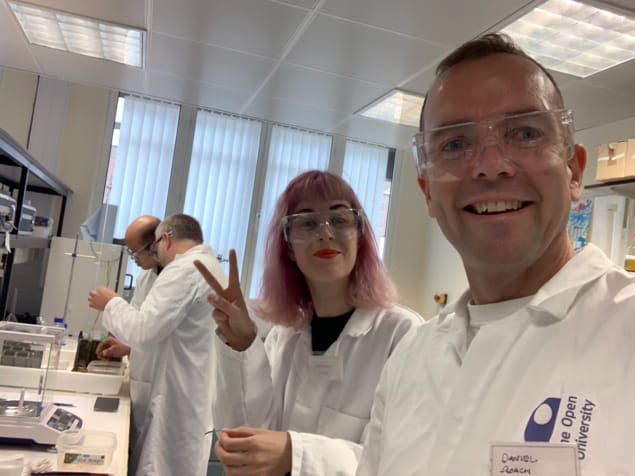As a mature student with the Open University, Dan Roach rekindles his love of practical experiment

Bang!
The Pyrex beaker is still intact but is now missing a significant quantity of its liquid content.
“Oh my god, I’m so sorry!” my partner exclaims as hydrochloric acid spreads across the lab bench in front of us both.
A quick check of the laboratory workbook confirms this is not in the instructions, so we both grab some deionized water, squirt it on to the spillage, and desperately mop it up with blue paper roll. No harm done and we’ve learned a lesson, which is that if you heat a wire in a Bunsen burner until it’s red-hot before dunking it in acid, you’ll get a reaction. Obviously, right?
We’ve been doing the classic flame-test experiment, which reveals what colours various metal salts go when they burn. It’s an experiment familiar to generations of high-school students but I’m doing it for the first time as part of the Open University (OU) level-1 laboratory summer school on its campus in Milton Keynes. My first degree is in computing science but I decided, aged 47, to go back to university to study physics part-time alongside my full-time job as an IT consultant.
My decision to do physics as a mature student came during the pandemic when a chance comment by a friend made me realize how little I understood about the universe. Keen to find out more about the mysteries of time, gravity, the Big Bang and black holes, I started taking some of the OU’s free OpenLearn online courses, which rekindled my joy of learning. From there, it was a short step to doing an OU physics degree.
The beauty of studying with the OU is that, summer schools apart, it’s done almost entirely by distance learning. As long as you have a decent laptop and Internet connection, you can fit in studying for the degree around the rest of your life, which is great if you have busy family or work commitments. When COVID-19 struck, traditional universities scrambled desperately to move online, but it was business as usual for the OU, which already had a superb online education platform.
The downside is you don’t get to mix in person with other students (though there are informal Facebook and WhatsApp groups). Another challenge when studying science remotely is that any experiments you try are rudimentary. Most of us don’t have radioactive isotopes knocking around at the back of the kitchen cupboard to measure half-lives. Unless, that is, you’re Marty McFly from Back to the Future, in which case you’ll already have a cache of weapons-grade plutonium to power your DeLorean (and a penchant for 1980s rock music).
An Open University summer school is the perfect opportunity to fill the gaps in your experimental knowledge, learn from your fellow students’ mistakes and share in each other’s successes
An OU summer school is therefore the perfect opportunity to fill the gaps in your experimental knowledge. It’s also a chance to see and learn from your fellow students’ mistakes and share in each other’s successes. My lab partner is Leeaaron Jones, who works in retail at a zero-waste community enterprise in North Wales but wants to move into microbiology. Together, we’ve been struggling to focus our spectroscope and get a nice sodium light spectrum to make observations. However, other students in the lab have got a great view of this and share a photograph with me.
The lab work is great fun. As is true at many universities, an OU degree involves taking a mix of subjects before specializing and, in fact, I’m surprised how much I’m enjoying the biology practicals. We’re collecting data about the lengths of the roots and the heights of the stems of wheat plants grown in various concentrations of salt water to see how the amount of salt affects growth rate. Aside from confirming that biology is the messy science, it’s a great lesson in statistical analysis and the variability between living things.
I also enjoy a chemistry experiment where we try to identify the metal in different liquid solutions both qualitatively and quantitatively using a colourimeter. We perform a titration on a sample of water we’ve brought from our home towns to pinpoint how hard or soft the water is (I’m from Rochdale and discover the water there’s fairly soft). We do the experiments in pairs and then pool the data from the whole group to get a more accurate analysis. We then validate this against the known water hardness data for that area.
And of course, we get to play with Bunsen burners to perform those flame tests.
The two-and-a-half-day summer school isn’t compulsory: the marks I get won’t count towards my final degree. But it’s been invaluable in terms of gaining real practical experience and working with proper experimental data that I and my group have gathered. Rather than handling made-up theoretical data, I’m learning to draw a straight line through a real, random scattering of dots, which is harder than you might think.
Apart from a day at the start of the course, this has been the only face-to-face contact I’ve had with other students and lecturers on my degree. I hope the OU offers more such opportunities as you can’t beat sharing a love of physics with other students, and receiving direct support and guidance from tutors. Online learning is all well and good, but science is at heart an experimental subject – even if we do need to be reminded of that by a blown-up beaker and a lab bench drenched in acid.



